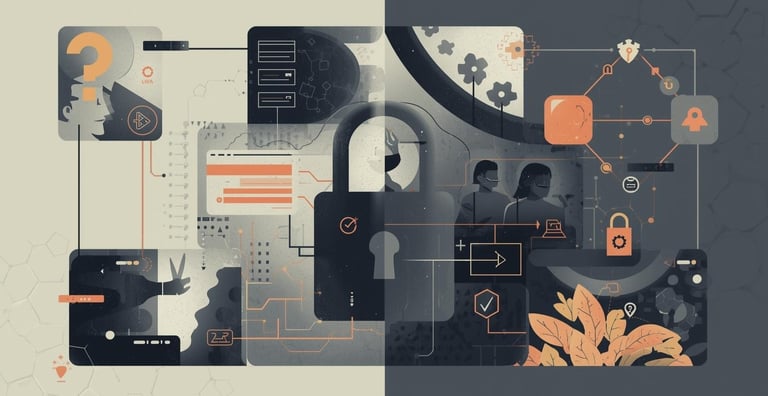Digital Brains and Mental Health: Opportunities and Challenges
"Can AI Heal the Mind? Digital Brains in Mental Health". Part 5
Gajanan L. Bhonde
9/3/20259 min read


Introduction to Digital Technologies in Mental Health
The integration of digital technologies into mental health treatment has marked a significant evolution in how care is delivered and experienced. With advancements such as artificial intelligence (AI), teletherapy, and wellness applications, mental health services are becoming increasingly accessible and personalized. Digital technologies have the potential to enhance traditional methods of treatment by offering a wider range of resources and support mechanisms that can be tailored to meet individual needs.
AI-driven tools are transforming diagnostic processes and patient monitoring. For instance, machine learning algorithms can analyze patterns in user behavior and emotional responses, allowing for more accurate assessments and timely interventions. This technology enables mental health professionals to track patients' progress more effectively and adjust treatment plans in real time. Additionally, wellness apps serve as companions in the journey towards mental well-being, providing users with resources such as meditation guides, mood trackers, and cognitive behavioral therapy exercises.
Moreover, the convenience and anonymity associated with these digital solutions can encourage individuals who might otherwise avoid sharing their mental health struggles to seek help. Online platforms offer the flexibility of accessing support services from anywhere, reducing barriers related to location or stigma. However, it is crucial to address the challenges that accompany this digital shift. The reliance on technology raises concerns about the privacy and security of personal health information, as well as the risk of misinformation from unregulated apps.
As we delve deeper into the role of digital technologies in contemporary mental health care, it becomes clear that while they offer significant opportunities for improvement, careful consideration is necessary to navigate the challenges they present. This examination is essential for optimizing the benefits while mitigating potential risks, ensuring a more effective integration of digital tools in mental health treatment.
The Rise of AI Therapy and Chatbots
The integration of artificial intelligence in mental health care has accelerated significantly in recent years, establishing a new paradigm in therapeutic support. AI therapy chatbots, such as Woebot, have emerged as innovative tools that offer real-time assistance for individuals seeking mental health support. These digital platforms utilize advanced algorithms and natural language processing to engage users in conversational interactions, providing a semblance of emotional support and guidance.
One primary benefit of AI therapy chatbots is their accessibility. Unlike traditional therapy that may be limited by geographical location, session availability, or financial constraints, these platforms operate 24/7. Users can interact with chatbots at their convenience, making mental health support more reachable to a broader audience. This instantaneous access is particularly advantageous for individuals who may experience anxiety or discomfort when seeking help in face-to-face settings. Furthermore, the anonymity provided by chatbots can encourage users to express feelings and thoughts they might withhold during real-world interactions.
Another key aspect is the ability of these chatbots to deliver tailored interventions based on user input. Through a combination of chat-based conversations and pre-programmed cognitive behavioral therapy techniques, AI chatbots can guide users through challenging moments, offering coping strategies and emotional regulation advice. This personalized interaction can serve as a valuable supplement to traditional therapy, especially for individuals in remote areas or those who are hesitant to pursue conventional therapeutic avenues.
However, while these chatbots present numerous opportunities for enhancing mental health support, it is essential to recognize their limitations. AI therapy tools should not serve as a standalone solution but rather as an adjunct to professional treatment when necessary. As technology continues to evolve, the role of AI in mental health care will likely expand, creating further discussion on best practices for integrating these tools with existing mental health systems.
Wellness Apps and Personalized Mental Health Management
The utilization of wellness apps has revolutionized the landscape of mental health management by offering users the ability to track a wide range of personal health metrics, such as mood, sleep patterns, and stress levels. These digital tools empower individuals to take a proactive approach to their mental well-being. By leveraging technology, these applications simplify the process of monitoring mental health symptoms and provide valuable insights that are crucial for effective self-management.
Many wellness apps are designed with user-friendliness in mind, allowing individuals to log their daily emotions, sleep quality, and stress triggers effortlessly. This data collection is not merely for record-keeping; it serves as a foundation for personalized feedback, which can guide users in understanding their mental health patterns. For example, an app might analyze mood fluctuations in relation to various life events or changes in sleep habits, offering tailored recommendations to improve overall well-being.
Furthermore, several wellness applications incorporate advanced algorithms that adapt to user-inputted data over time, making mental health management increasingly personalized. These features can include mindfulness exercises, sleep meditation, or even breathing techniques, all customized based on the individual’s unique requirements. This targeted approach ensures that users are not only receiving generic advice but rather insights that resonate with their specific challenges and circumstances.
In addition, many wellness apps promote community support by connecting users with others who share similar experiences, reinforcing that they are not alone in their mental health journeys. By bridging the gap between digital resources and user interaction, these platforms encourage a holistic approach to mental health, further enhancing their potential for positive impact. As we explore the evolving role of technology in mental health, it becomes evident that wellness apps play a significant part in managing mental health proactively and effectively.
The Promise of Brain-Computer Interfaces (BCIs)
Brain-Computer Interfaces (BCIs) represent a groundbreaking paradigm in the intersection of neuroscience and technology, offering the potential to transform the treatment of mental health conditions such as depression and anxiety. These interfaces establish a direct communication pathway between the brain and external devices, facilitating the modulation of brain activity to achieve therapeutic outcomes. Current research in the field of BCIs has focused on understanding how these technologies can effectively be harnessed to balance neural activity, thereby alleviating symptoms of various mental health disorders.
Recent studies have demonstrated that BCIs can be utilized to monitor brain activity in real-time, allowing for the identification of neural patterns associated with specific emotional and psychological states. By employing neurofeedback mechanisms, patients can learn to regulate their brain function, potentially reducing the severity of depressive and anxious episodes. This interactive approach not only empowers individuals in managing their mental health but also opens new avenues for personalized treatment strategies that cater to the unique neural profiles of each patient.
Moreover, advancements in this field are amid a rapid evolution, with researchers exploring the integration of BCIs with other therapeutic modalities, such as cognitive behavioral therapy (CBT). This multidisciplinary approach holds promise for enhancing treatment outcomes, as it combines technology with established psychological frameworks. Additionally, ongoing investigations aim to optimize the design of BCIs to make them more accessible and user-friendly, broadening their reach within the mental health landscape.
In conclusion, the potential of brain-computer interfaces in the mental health domain is promising, offering innovative avenues for addressing conditions such as depression and anxiety. As the technology continues to develop, rigorous research and ethical considerations must guide its implementation to ensure both efficacy and safety in therapeutic environments.
Potential Risks: Dependency on Digital Solutions
As the integration of digital solutions into mental health care continues to rise, it is crucial to consider the potential risks associated with an over-reliance on technology. While applications and chatbots offer convenience and accessibility for users seeking mental health support, this dependency may inadvertently hinder individuals from pursuing essential face-to-face human interaction and professional intervention. The allure of online resources can lead users to substitute critical therapeutic relationships with algorithms, which could compromise the effectiveness of their mental health management.
One significant concern is that individuals may develop a false sense of security about their mental health by relying solely on these digital platforms. Applications designed for self-help often lack the nuanced understanding and empathy that a qualified therapist provides, potentially resulting in a situation where deeper psychological issues remain unaddressed. This reliance might foster symptoms of dependency on the digital tools themselves, rather than encouraging users to build coping strategies and resilience through professional guidance.
Moreover, digital solutions may inadvertently promote avoidance behaviors, as individuals might opt for anonymous interactions with chatbots instead of seeking necessary help from licensed professionals. This choice can lead to isolation as users retreat to the digital realm instead of engaging in meaningful connections with others. Consequently, mental health conditions may worsen over time due to the lack of comprehensive support that only trained professionals can provide.
Lastly, privacy and data security concerns play a crucial role in this discussion. Users may fear that their personal information could be compromised when utilizing digital platforms for mental health. This concern can lead to reduced engagement with available resources, further increasing dependency on self-reliance behaviors that might not be conducive to healing. To navigate these risks, it is essential for individuals to strike a balance between utilizing digital solutions and seeking traditional therapeutic interventions, ensuring a holistic approach to mental well-being.
Privacy Concerns in the Digital Mental Health Landscape
The integration of digital technologies into mental health care has ushered in numerous opportunities for improved access to treatment and enhanced patient outcomes. However, this evolution has also raised significant privacy concerns surrounding the sensitive nature of mental health data. Unlike other types of information, mental health data can contain deeply personal details that, if mismanaged, can severely impact an individual's emotional well-being and social standing. As such, ensuring the confidentiality of this data is of paramount importance.
Digital mental health platforms, ranging from teletherapy to mobile apps, routinely collect a wealth of information from users. This information can include not only clinical data and personal health histories, but also personal identifiers and behavioral patterns. The value of this data is undeniable, making it a target for data breaches and unauthorized use. Reports of security lapses and breaches have accentuated the risks associated with sharing mental health information online. Such incidents not only compromise the privacy of users but also erode the trust in digital mental health solutions, thus hindering their widespread acceptance.
In the wake of these challenges, the necessity for stringent ethical standards and robust security measures in the digital mental health landscape becomes clear. This includes establishing clear protocols for data handling, ensuring informed consent from users, and implementing strong encryption methods to safeguard sensitive information. Moreover, mental health practitioners and technology providers must work collaboratively to establish transparent practices that empower users to control their personal information. By prioritizing privacy in digital mental health solutions, stakeholders can create a safer, more trustworthy environment that encourages individuals to seek help without fear of compromise. Implementing these protective measures will be crucial in fostering a secure and supportive digital landscape for mental health care.
Balancing Technology with Human Connection
In the contemporary landscape of mental health care, the integration of digital tools has revolutionized how services are delivered. While technology offers remarkable opportunities for improving access and efficiency in mental health treatment, it is crucial to emphasize the importance of combining these tools with human empathy and connection. Digital platforms, such as teletherapy, mental health apps, and virtual support groups, provide valuable resources that can enhance patient engagement. However, these digital solutions should not overshadow the significance of personal interactions that foster trust, understanding, and emotional support.
The therapeutic relationship between mental health practitioners and patients is a cornerstone of successful treatment. This connection is founded not merely on the exchange of information, but on genuine emotional engagement and empathy. While digital tools can facilitate communication and offer immediate assistance, they often lack the nuanced understanding that comes from in-person interactions. Conveying empathy and emotional support through a screen can be challenging and may not adequately fulfill the emotional needs of individuals struggling with mental health issues.
Furthermore, human connection is vital for mitigating feelings of isolation and loneliness, which are often exacerbated by mental health conditions. By integrating technology with traditional therapeutic approaches, mental health professionals can create a harmonious balance that leverages the benefits of both realms. For example, utilizing digital tools for preliminary assessments and follow-up check-ins can free up time for practitioners to engage in deeper conversations during in-person sessions. This dual approach enhances the overall treatment experience and ensures that technological advancements serve as a complement to human interactions.
Ultimately, fostering a balanced approach to mental health care requires ongoing reflection on the role of technology within the therapeutic process. It is crucial to remain vigilant against over-reliance on digital methods at the expense of personal connections. Achieving this delicate balance will ensure that technology enhances mental health treatment while preserving the essential human elements that underpin effective care.












